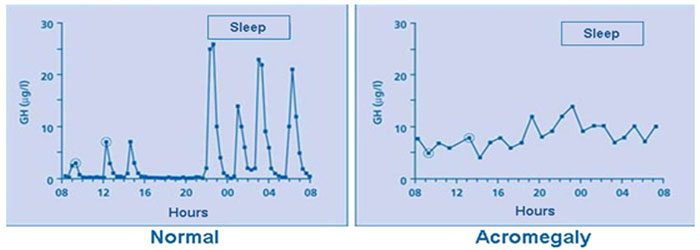
HGH Deficiency Causes In Adults
Human growth hormone deficiency can cause many problems for adults. HGH deficiency causes are not always identifiable, yet the symptoms persist. That is because growth hormone deficiency (GHD) will not rectify itself.
Many adults diagnosed with HGH deficiency will never learn a concrete reason as to why this condition occurred. For some, the doctor will likely chalk it up to the body not adjusting to the natural decline in growth hormone production. By the time we reach our mid-twenties, the pituitary gland starts a gradual decrease in how much HGH it produces each day. Decades later, the body may begin to show the effects of this reduction.
In some instances, growth hormone deficiency causes in adults may be genetic or continue forward from childhood. Many of these individuals will begin working with endocrinologists in their youth to correct short stature issues related to HGH deficiency. Unfortunately, some people never find out they have low growth hormone levels as children. For them, an adult diagnosis can do nothing to help them achieve growth as they are likely on the shorter side as adults. However, receiving HGH therapy as an adult can help the body in many other ways.
Adult HGH deficiency causes may stem from childhood or develop in adulthood.
Genetic and Child-Onset Causes of HGH Deficiency in Adults
Among the most common HGH deficiency causes in adults that we can identify is childhood-onset GHD. Although you may have received HGH therapy as a child to help you attain normal adult height, your body may still be on the low side for growth hormone secretion. If that is the case, you could suffer the symptoms of GHD as an adult.
Genetics may play a role in growth hormone deficiency for some individuals. A specific gene may not develop properly during fetal growth. Syndromic causes are also possible, where an issue with brain development while in the womb could be the factor.
Genetic defects associated with congenital growth hormone deficiency include:
- Growth hormone deficiency IA – autosomal recessive with growth retardation in utero. Initial response to HGH administration is present but then the child develops antibodies to growth hormone inhibiting growth.
- Growth hormone deficiency IB – autosomal recessive although some growth hormone is present at birth. The child responds to continued HGH treatment.
- Growth hormone deficiency IIB and III – these causes are similar to IB. The difference is IIB is autosomal dominant. III is X-linked (caused by an abnormal X chromosome gene).
If growth hormone deficiency is present at birth, the condition is congenital. Certain syndromes can lead to GHD. Some examples of growth hormone deficiency cause – genetic syndrome-related include:
- Turner syndrome – a chromosomal disorder affecting females along with increased risk of Hashimoto’s hypothyroidism and celiac disease
- Prader-Willi syndrome – characterized by short stature, chronic hunger, low muscle tone, and other issues
- Noonan syndrome – autosomal dominant genetic disorder causing skeletal malformations and other issues
- Laron syndrome – rare genetic disorder where growth hormone receptors cannot use the HGH the body produces
Finally, a brain injury or tumor during childhood can cause growth hormone deficiency.
Childhood-onset growth hormone deficiency is often diagnosed at a young age.
Causes of Acquired Adult HGH Deficiency
Adult-onset or acquired growth hormone deficiency is an entirely different situation. Individuals who experience the signs of GHD as adults will benefit from contacting a hormone replacement therapy specialist to discuss their concerns.
What are the causes of HGH deficiency in adults when they never had issues as children?
Because growth hormone levels naturally decrease as we age, the simple passing of time can be a reason for low HGH levels.
Although the following HGH deficiency causes are not very common, they could be the reason for declining growth hormone levels:
- A tumor in the pituitary gland or hypothalamus affecting growth hormone secretion
- Treatment of radiation or surgery for a tumor as mentioned above
- Severe or traumatic head injury
- Abuse of opioids which can lead to impaired growth hormone production or functions
- Autoimmune disease
- Sheehan’s syndrome which interferes with blood supply to the pituitary gland
- Certain infections
If a tumor is present, there may likely be other issues, including headaches that can help the doctor pinpoint a cause of GHD. Both blood analysis and physical examination help determine if there is a specific and identifiable cause of adult-onset growth hormone deficiency. The results from the exam and testing may also show if there is cause for other concern, such as with a tumor, infection, or another disease present.
Direct causes for growth hormone deficiency in adults are rare, such as with a tumor or head injury.
Undetermined Causes of HGH Deficiency
When we examine the various HGH deficiency causes, we often find that most adults do not have an obvious reason as to why they experience symptoms of growth hormone decline. Idiopathic GHD means that no cause of the decline is apparent.
We find that undetermined causes of HGH deficiency sometimes have to do with lifestyle habits. Growth hormone release occurs during daytime and nighttime hours. Nocturnal HGH release accounts for more than half the daily allotment of growth hormone production. Your body requires a minimum of seven hours of quality sleep to allow for enough time spent in slow-wave sleep for HGH release. If you do not get enough rest, your risk of becoming growth hormone deficient increases.
A sedentary lifestyle also leads to low HGH levels as exercise helps increase the daytime pulsatile bursts of growth hormone.
How much and when you eat are other contributing factors. After you eat, growth hormone production declines. If you are the type of person to eat three meals and snack throughout the day, your body never has a chance to secrete enough HGH. Intermittent fasting is an excellent way to protect against HGH deficiency. Also, people who are overweight are most inclined to be growth hormone deficient.
Finally, stress is one of the biggest enemies of growth hormone. The stress hormone cortisol increases when HGH levels are low and decreases when growth hormone is high. Because elevated cortisol interferes with sleep, it inhibits HGH secretion.
Again, one of the most common causes of adult HGH deficiency is the natural cycle of aging. With HGH levels declining a bit more each year, combining it with any of the factors mentioned in this section can increase your risk of developing associated symptoms.
A consultation with a hormone specialist here at HT Medical Center may help you get to the bottom of your symptoms so that you can receive the appropriate treatment for your body.
Undetermined causes of HGH deficiency in adults may stem from aging or lifestyle habits. Contact us today for a free consultation to learn more.


















